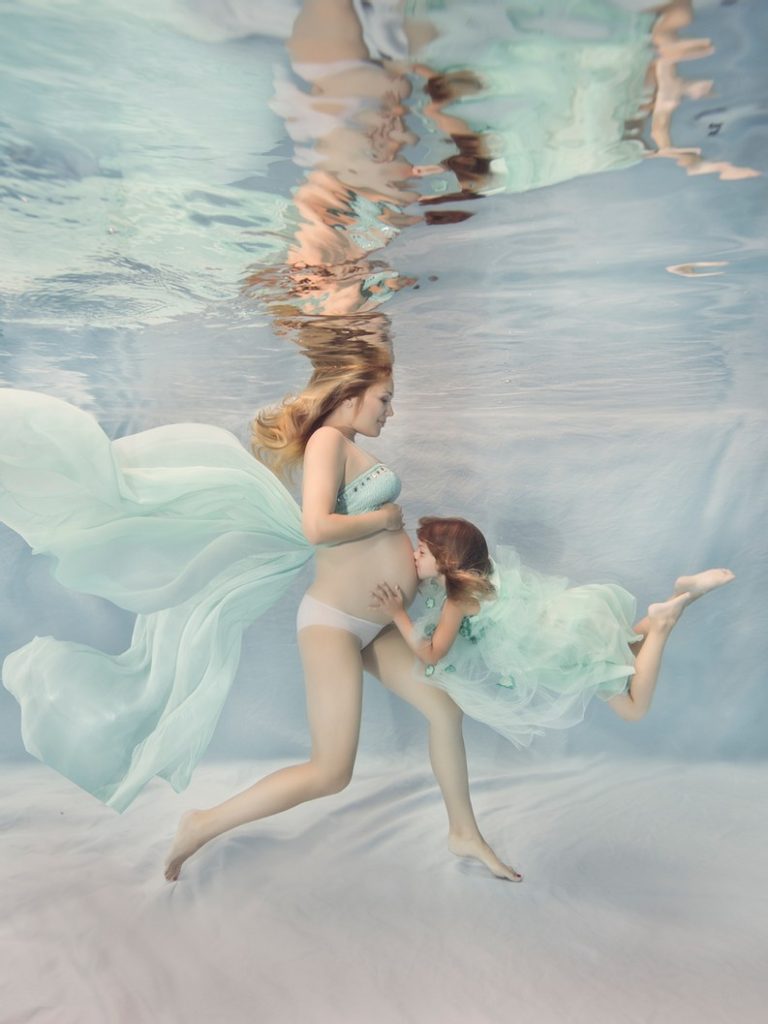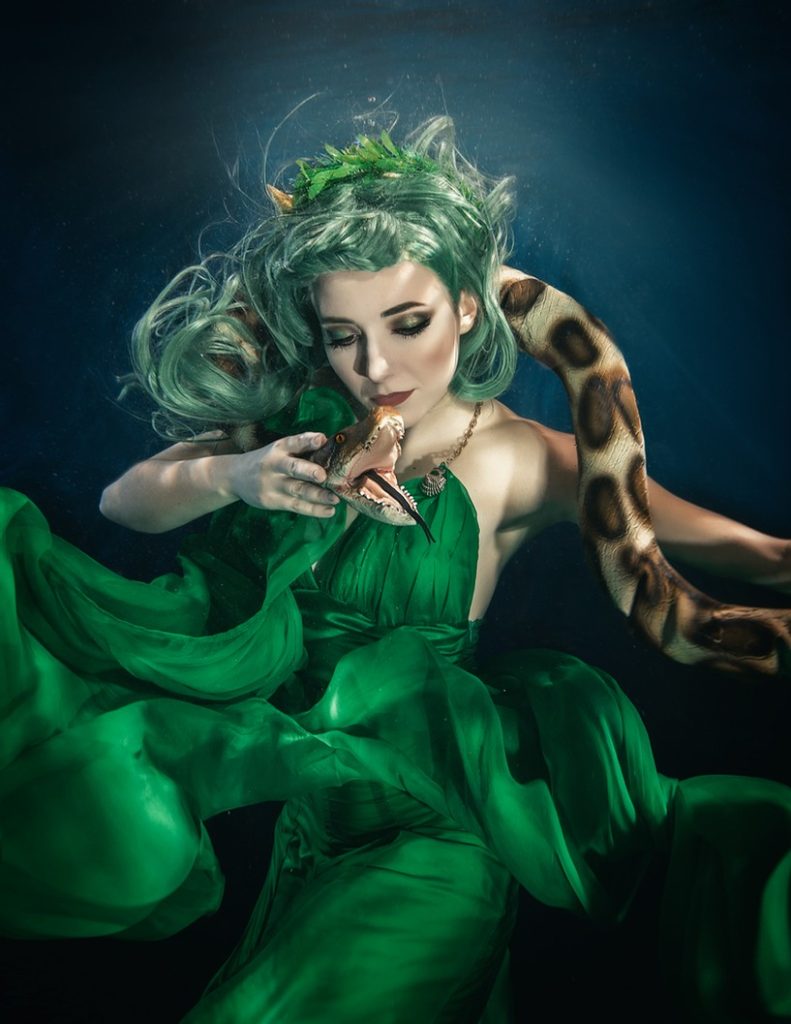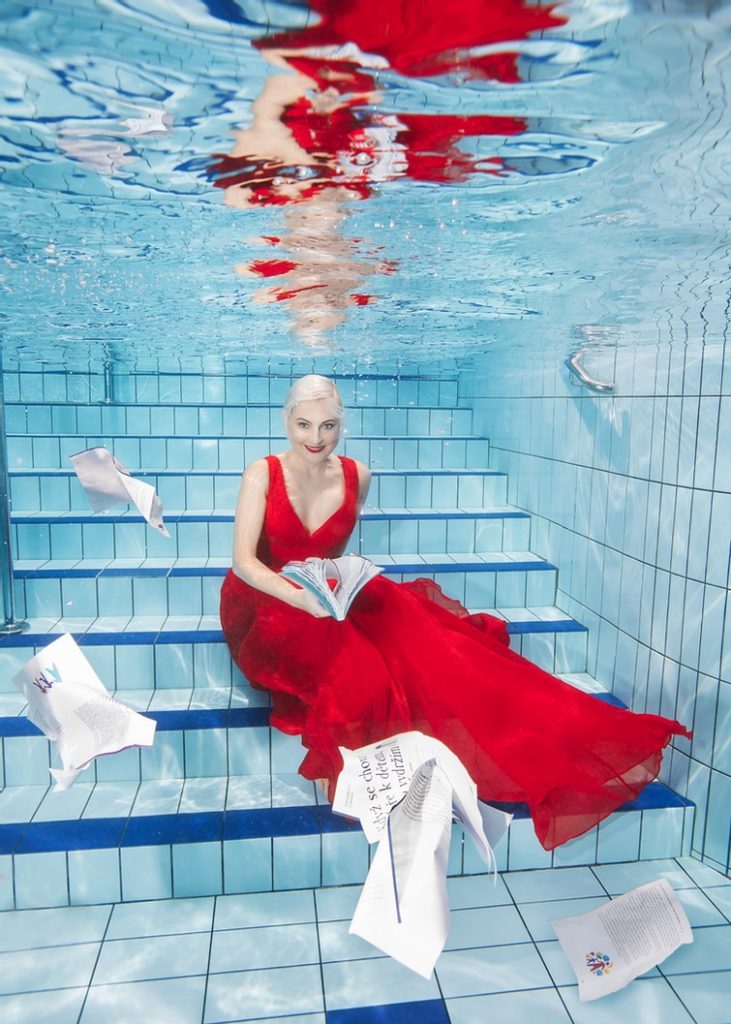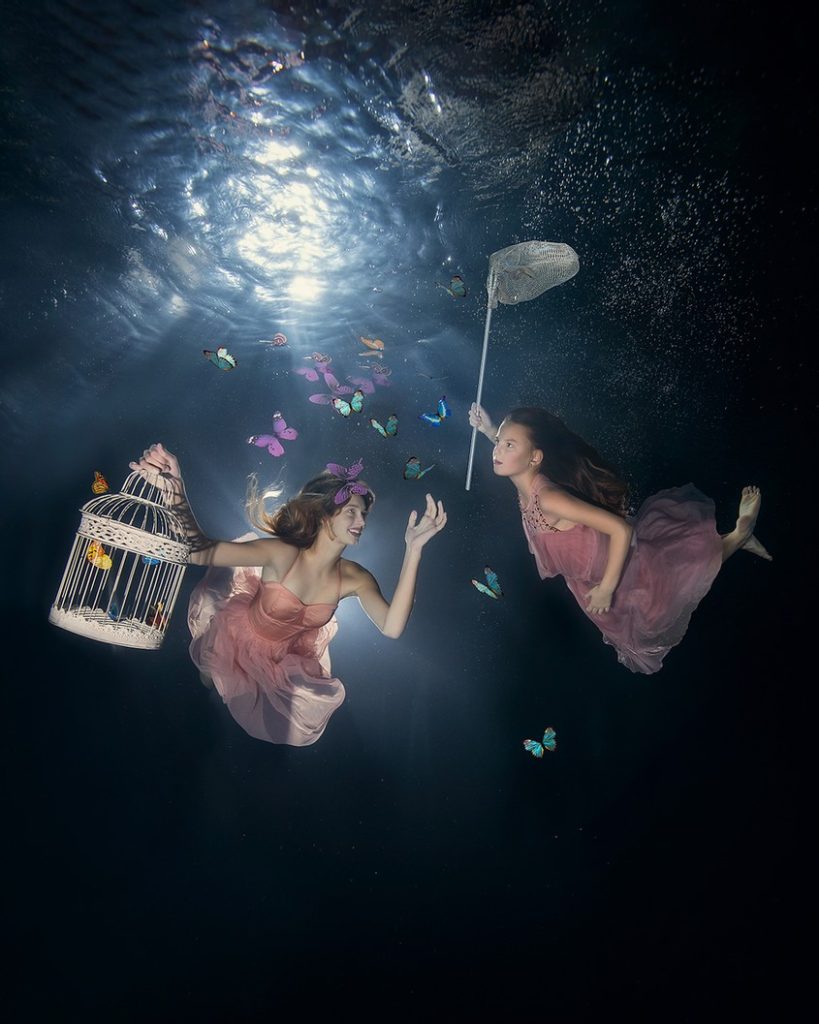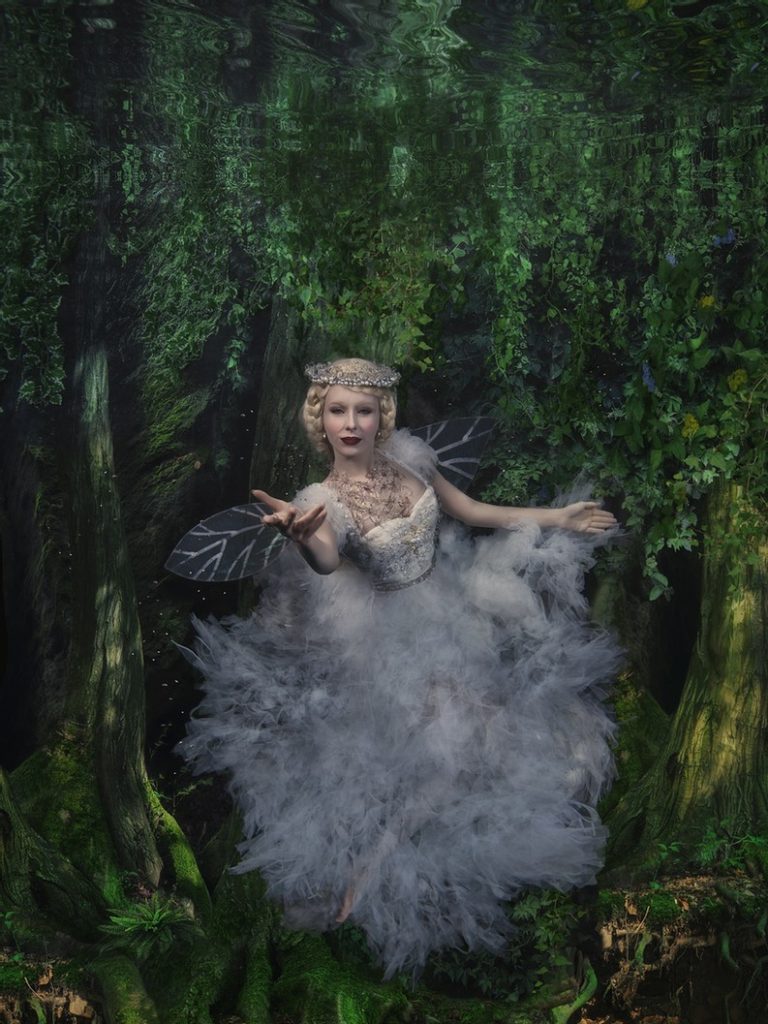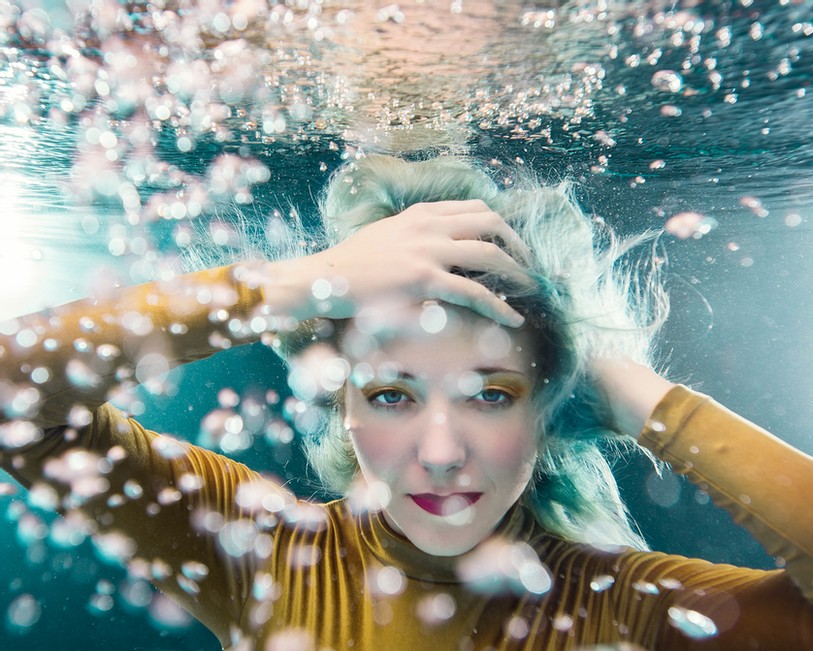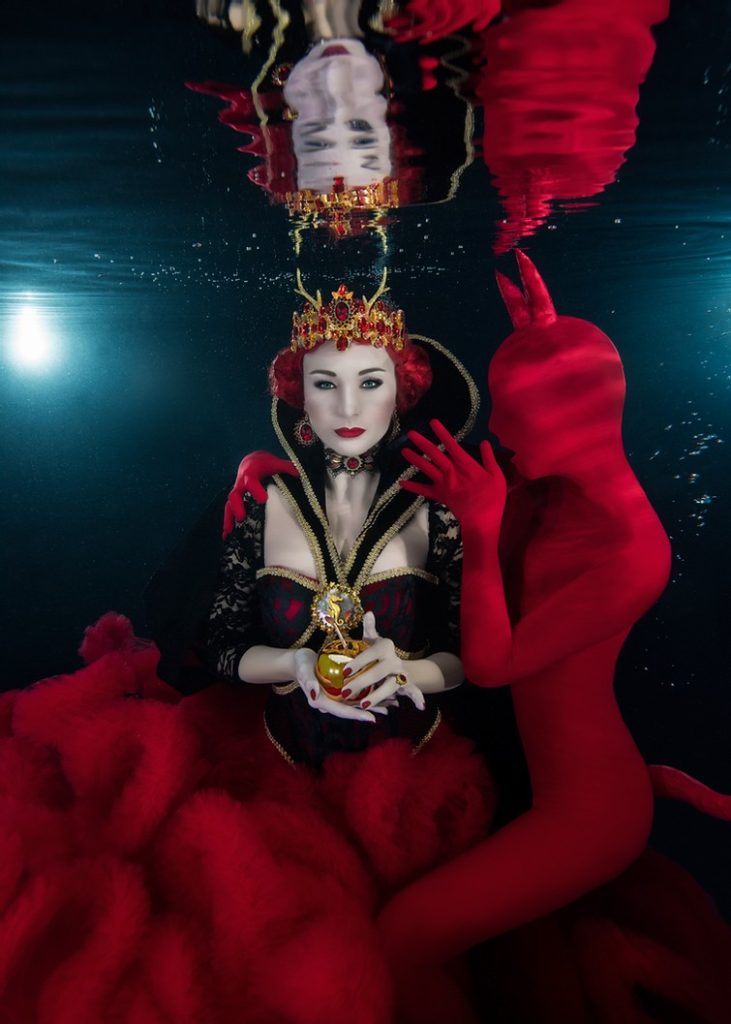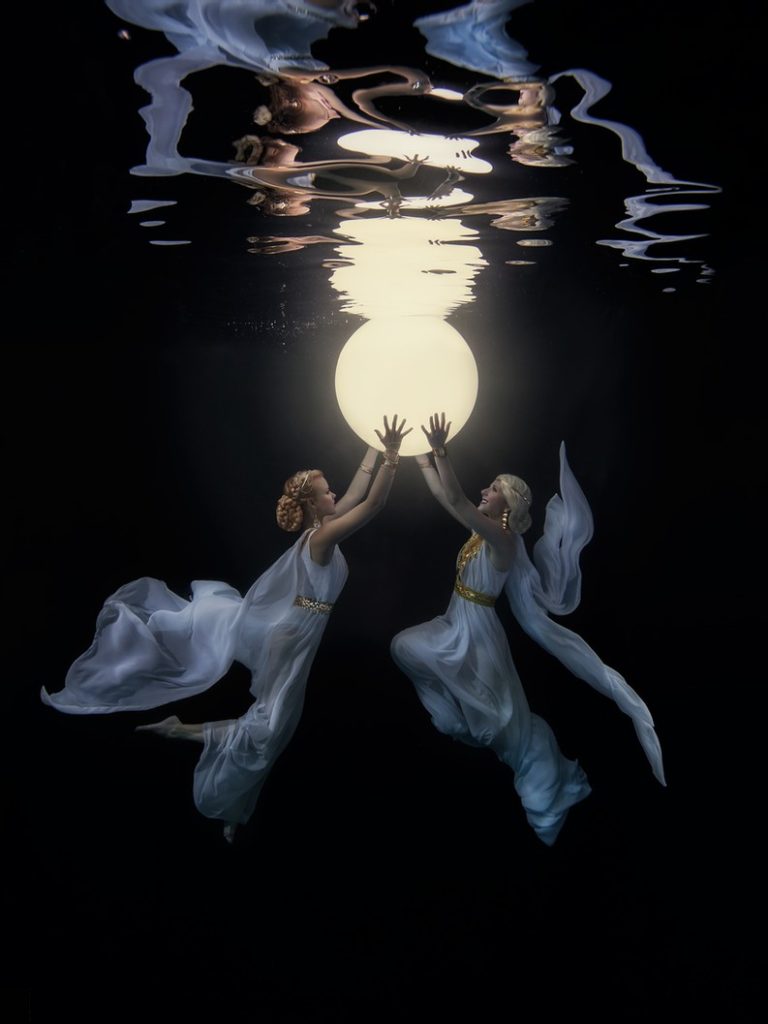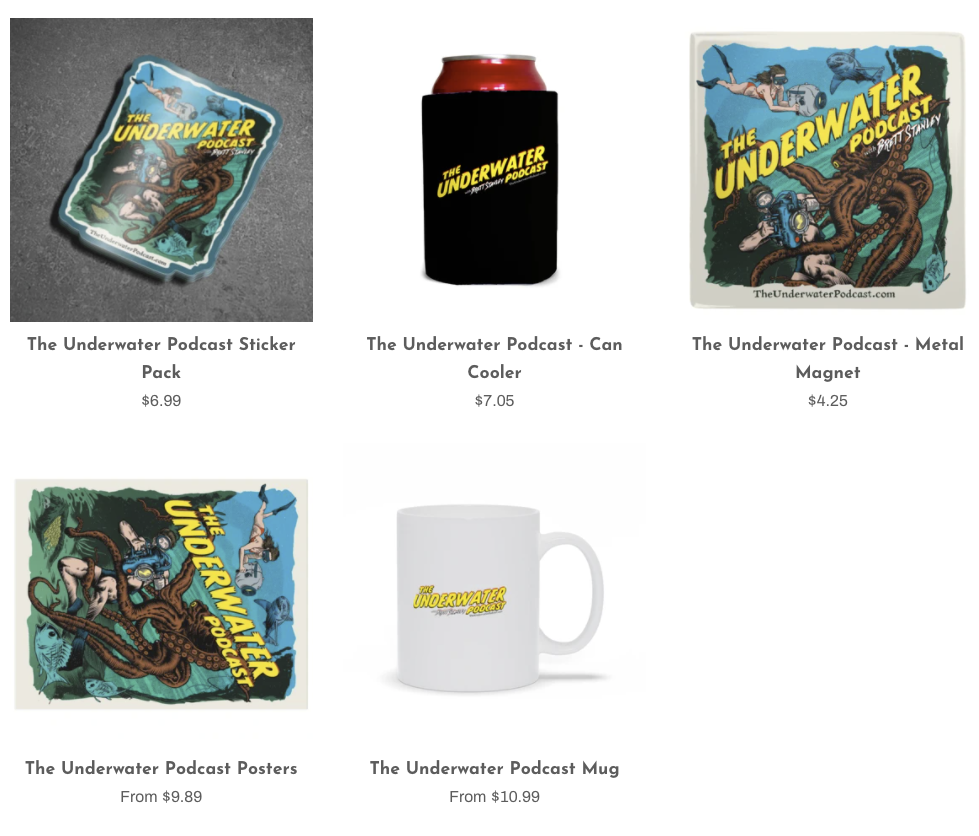Conceptual Photographer Lucie Drlikova
In episode twenty one, host Brett Stanley chats with underwater photographer Lucie Drlikova in the beautiful city of Prague, in the Czech Republic.
Lucie’s work is a beautiful mix of fantasy, wonder, and perfectly executed concepts. She makes a lot of the set pieces, props, and outfits herself – and combined with her crisp clean post production her underwater images really come to life.
They chat about her travels, finding her love for underwater photography, the celebrity and charity projects she’s been involved in, and a very cool technique for helping her clients relax in the water.
Follow Lucie: Website, Instagram, Facebook
Discuss the episode in our facebook group.
Visit our YouTube for livestreams
About Lucie Drlikova – Conceptual Photographer
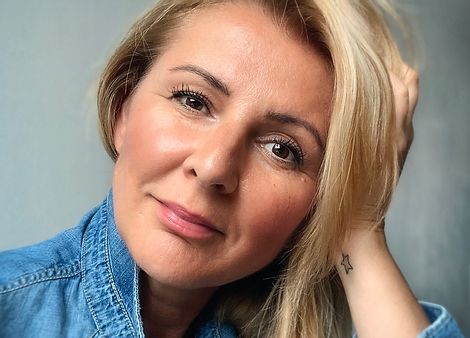
Lucie Drlikova is award winning underwater photographer, originally from Czech republic, currently living in Prague, after twenty years of living in different parts of the world.
She grew up exposed to art and culture through the passion of her dad’s dark room and her mom’s fairy tales and story books. Fostering her vivid imagination and a love for reading and painting, Lucie still followed a different professional path and landed a job in a corporate environment.
She started diving at the age of twenty-two and has never stopped. To show her mom that the underwater world was a safe one, she purchased her first little point and shoot camera to bring back images to share.
Convinced that being an artist was not supposed to be a job but only a hobby, Lucie never thought she would one day become an underwater photographer as a profession. She continued to pursue this as a passion combined with her love for scuba diving.
However, when in the last few years of her growing career her health became affected by the high stress levels, Lucie decided to change something in her life. She quit her job and decided to follow her dreams through photography and diving; her desire to create memories and to know her life had not been wasted.
Leaping into an unknown environment she started to create images with the help and support of her friends happy to be either in the water in front of her lens or behind the scenes assisting with anything needed to be done. It was a natural step for Lucie to connect being in the water to express her fantasies through photography. Underwater it was easier to create landscapes where people could fly and worlds could be upside down.
Persistent through her work, she specialized in underwater portraits, but continued to feed her creative soul with her personal projects.
Using her multitalented capabilities, each image is the result of a vision, a note, a drawing, a memory followed by a complex work of creating her own costumes and props, make-ups, drawing and painting her own backgrounds and coordinating people above and below the water. Photography is in a way a very small part of the entire creative process that sees Lucie involved in each and every aspect with the same energy and passion. There is not one day when Lucie is not thinking about her next image, her next project, her next dream.
Podcast Transcript
Ep 21 – Lucie Drlikova
Brett Stanley: [00:00:00] Welcome back to the underwater podcast, and this week we’re breaking quarantine and hanging out with underwater photographer lucy Drlikova in the beautiful city of Prague in the Czech Republic. Lucy’s work has a beautiful mix of fantasy, wonder and perfectly executed concepts. She makes a lot of the set pieces, props and outfits herself and combined with a crisp, clean postproduction her images really come to life.
We chat about her travels, finding her love for underwater photography, the celebrity and charity projects she’s been involved in and a very cool technique for helping her clients relax in the water. All right. Let’s dive in.
Lucy welcome to the underwater podcast.
Lucie Drlikova: [00:00:37] Hello? Hello. Thank you very much for inviting me.
Brett Stanley: [00:00:40] you’re living in Prague now, but you’ve, you’ve traveled quite a lot. Right? Cause I think the first time I saw your work was I think he might’ve been in The Bahamas or
Lucie Drlikova: [00:00:48] actually now I am finally last three years back in my home country, but last 25 years, I was living in different countries. And the, before. Uh, before Brock, I used to live in Miami, in Florida. And in Bahamas, when you saw the pictures, it was because I was visiting my friend. Christina’s the famous shark lady in Bahamas.
And it’s very, probably you saw the pictures from Bahamas. So, but now I am back home in my home countries and missing the ocean.
Brett Stanley: [00:01:27] Yeah, exactly. It must be hard. I mean, it’s such a landlocked country
Lucie Drlikova: [00:01:31] I know, but on another, another side I have all my family and friends here, so, and somehow I was already tired to be 25 years with the luggage cheese in different countries. The countries are nice, but they will be never. Your home, you know what I mean? So, so that’s, it’s, it’s, I’m missing it, but on another side, I’m happy that I can build my own home.
And, and so
Brett Stanley: [00:01:59] Yeah. And so with all that traveling, was that because of work or was it were you’re traveling just because
Lucie Drlikova: [00:02:04] It was because I was not a photographer in my. Fast. I used to work in corporate and I was a sales director for like international companies. So I used to live in Russia money, uh, the countries. And then before I was, I think, two years in New Zealand. And in America, I didn’t work in America already. I started my photography, but I moved to America because of my family for two years.
But, um, I am actually doing underwater photography, like full time job from May, 2013. When I really decided quit all my jobs and just do what I laugh. And not spend my life in office and plane and suits and all this stuff. And I think it was my best decision in my life. And sometimes it’s hard. It’s not easy, you know, so I don’t need to tell you, but I still it’s a big freedom.
And it’s something which I don’t call a job. I call it like, I’m playing, I do what I laugh and I spend the days with this and you just make the money with that. But it’s not a job it’s for me, like a, my passion, something which, which I’m really happy. I can spend the time doing that.
Brett Stanley: [00:03:39] Yeah. And I think a lot of us are really lucky to be able to have that, that passion that pays the bills
Lucie Drlikova: [00:03:44] Yes. Yes. Yes. Yes.
Brett Stanley: [00:03:46] So, how was the transition for you from going from that corporate, um, corporate kind of job into the art world?
Lucie Drlikova: [00:03:52] For me was because I actually grew up in the family. Then my dad was photographer and my brother did photography, but I never, I never was really interested in death. I want that always do paintings and stuff like artistic, but not photography. And then, uh, I did all my life. The scuba diving. So I like almost like now 27 years of scuba diving.
And, uh, so I started, uh, I about both my first and I started to do the Marine Marine life, a patient for sharks and big fishes and all that. And, um, I did first. I never Gemma did. I can do a portrait with the people, but it’s happening. Like I’ve called lucky accident. Uh, in Egypt, the, the last day of, before we took a plane, we can not scuba dive.
And I’m not a person who can lie on the beach because after five minutes I get bored. So I, I really convince my friends. Let’s go play in the water in the shallow water, just I do, I will do some fun. And so, and then. We did first portraits. And I was like, wow, it’s not wild because it was nice. But wow.
Like I discovered another ward, something which is like very fantasy, very creative. You can do a lot of stuff. So it was beginning. And then I came back home and I. Call my best friends. Like, hold on, let’s go. Let’s find some swimming pool. Let’s let’s, let’s try to do this just for fun, because in the moment I was they’re working in the corporate, so it was like, let’s do it on the weekend.
Let’s do that because it was really so much fun for us. And then I discovered this point when. I can build my owl scene. I can do something different. And this started before Cybos like a, I don’t know, I was like amazed, like a kid who is watching on the Christmas tree and a lot of gifts. So it was for me like that.
So I was, I was really, it’s changed everything in my life. This point.
Brett Stanley: [00:06:17] Yeah. Very exciting. And I think that’s, you know, that when you kind of find that, that thing that speaks to you, like you did in the water. And then it kind of opens up your mind to all this extra stuff. Like, is that like a Christmas tree
looking at all the gifts
Lucie Drlikova: [00:06:31] Yeah. But by me, it’s actually, everything started because I have a big laugh for Boulder. Same really aquatic persons very much. And I love weather and I love to put my head in the water. So, so I think it started with that and because the gravity doesn’t exist and all that stuff. So it’s fantasy world.
It’s different.
Brett Stanley: [00:06:55] Yeah. And so how did you go going from, from scuba stuff and shooting Marine life to shooting people and portraits. And I assume that was still in the open water or were you shooting in swimming pools as well?
Lucie Drlikova: [00:07:07] the beginning, I shoot. Whenever it was possible. I mean, sometimes we found some pool, but on the beginning it was more like, uh, the travel at the, for scuba diving. We tried with my friends, but it was not the big dresses, nothing like that. It was just like, let’s try it in bikini. And we have one scarf.
Let’s try this because I discovered on the beginning how the light was working, what is possible? What not? Uh huh. Because I learn it also on myself. Uh, How the model should work because buddy from not me, not my friends that are experienced it. So it’s try not good. Try again. Not good. No. So we spent a lot of time, but for us it was really fun.
So we love it. And also my friends, they still remember this as a big adventure.
Yeah, because on the beginning we did some stuffs, which I will never do now because of the safety reason, but because we’re crazy and a little bit lucky because we survive it. I will not do it now without the big theme or something, but, uh, lucky we all survived.
Brett Stanley: [00:08:31] That’s great. What sort of things were you doing? Is there
Lucie Drlikova: [00:08:33] Like, uh, like the Gail she’s both not experienced, said we tied her hair on some rope in 20 meters, deep ocean. And she was waiting only that the scuba diver give her the air and the girl was not experienced, said they was one safety only me who was not, who was not experienced photographer. But I was experiencing scuba diver, but for me on the beginning, I can see it.
Uh, I was too much concentrated on the camera because the camera was quite new for me nowadays. I have the camera somehow out, automatically in my hand. So I am able with one eye, watch the camera, second eyes watching what the model is doing, what my safe at the team is doing. But on the beginning, Uh, I was concentrating on the, only on the buttons on the camera.
So it was more crazy time.
Brett Stanley: [00:09:31] Yeah. That’s what happens, I think is you end up kind of
concentrating on, on that new thing and
not, not thinking about the whole,
Lucie Drlikova: [00:09:38] nowadays, I am the most of my concentration is going now on the safety. X-ray it’s more important for me now than the good picture, because the good picture you can do second time, but it’s safe. It is going something wrong then you may have not a second time.
Brett Stanley: [00:09:57] Well, yeah, that’s, that’s a very good
point. Like you only get one chance at safety, but you get many chances at
the shot.
Lucie Drlikova: [00:10:02] Exactly. And I am shooting in eight meters, deep pool. I don’t know how much is it a feed it, but it’s quite a lot because I think it’s a,
Brett Stanley: [00:10:12] Like 24 feet.
Lucie Drlikova: [00:10:14] yeah, something like that. So it’s quite deep. So I need to take care about the safety because it’s maybe dangerous.
Brett Stanley: [00:10:21] So that’s a good, a good kind of technical question is I’ve seen sort of pictures of the pool you’re swimming in, on shooting in. Um, and I, it looks like it’s a dive. Well, uh, is it for free divers or for scuba divers
Lucie Drlikova: [00:10:34] Yes, it’s a training, a whole for scuba, scuba and free divers.
Brett Stanley: [00:10:39] Right. are you using that depth or are you just, is that just the pool that you have to use?
Lucie Drlikova: [00:10:44] Uh, it’s just the pool, which I have to use because it’s quite difficult to rent the pool in Czech Republic because most of the pools are for public. So that’s mean if you wanna rent it. They offer you only like nighttime or early morning before the public is coming, because you cannot shoot in between the public it’s impossible.
And this is only pool in Czech in Prague. What, uh, Kendra, anytime if I like. Uh, and the pool is quiet, so the models can stay there for three hours and she can survive it because a lot of the pools are not heated because they are for swimmers. So the water should be a little bit colder, but this pool, but I’m using it actually 99.
I am using the depth between up to four meters. That sometimes, but sometimes I need to go lower, but usually not the model, for example, if I want to make the point shooting from down to up. So I’m going, for example, to seven meters or my, uh, my theme when they light it from the down. So they go lower. But the model is usually between zero two, three, four meters.
No more.
Brett Stanley: [00:12:11] Right. Yeah. And are you on scuba as well, or are you
Lucie Drlikova: [00:12:15] No, no, I am free. I am, I am free diving. I started in the pool with the scuba, like a, I think two times, but then I figure out it doesn’t make me. This freedom, which I need because the model is going up and down and going up and down all the time with scuba. It’s terrible. And so I decided no more scuba in swimming pool and in this depth.
Up to 10 meters. I can do it on one breath, like the models. And so, because I’m also certified the freediver, so like I can do it and I have much more freedom to move. And also my team, uh, they are all certified free divers.
Brett Stanley: [00:13:03] Oh, okay. So everyone on your team is, is freedom, I think.
Lucie Drlikova: [00:13:06] Every everybody on my team is free diving. Plus they are also all scuba divers. So they have both, if it’s necessary. For example, sometimes we are shooting something that I need, that one of my person will be all the time in scuba, because need to be on one position without moving. So the person is going on scuba, then the rest is going on free.
But so, because we are all flexible because they have both, they have free diving and, uh, also scuba diving license
Brett Stanley: [00:13:39] Right. And what about your models? Are they experienced underwater models? Are you working with a range of experiences?
Lucie Drlikova: [00:13:45] of what I’m doing for my project. I am using model sometimes. I don’t, we don’t have experienced that because we don’t really, this is the new quiet in check. So I have a few girls, which I am working more than once and this, uh, I already trained them on the beginning, but they was already like, they loved the water.
So the training was quite very easy with them and, uh, So, and sometimes I am working with them more for my project sometimes, but usually it’s like for my project, when I’m working, what I’m working on now, there’s a once upon a dream in Waterland. So this is each photo. Needs to be different person, different collector.
So I don’t have so many experienced models in check. So I usually become one person which looks a little bit like my Proctor. I would like the cheese playing. And then I spend with there, with her, for example, some hours of the training. Without a big dress without everything to train him, how she should move, what she should do.
And so, and the same I’m doing with my clients because, uh, of course I’m shooting a client’s underwater. So we, before we started shooting, we always spent like, Then eliminates 30 minutes with the like basic training, because sometimes a lot of my clients, they are coming first time. So they have no experience, nothing.
They never put that. And sometimes I have a client who never open it, uh, I in the water before, so I need to spend the time some, somebody is ready after 10 minutes, somebody after five, somebody after 20. So it’s. It’s each person is different. So I’m working what I get. So I’m working with this.
Brett Stanley: [00:15:49] Yeah. when you have someone who’s new to it, so say if you’ve got a client, who’s come along, who hasn’t done this before and they can’t open their eyes and they’re, you know, say they’re scared
or they’ve got some anxieties. What are you doing? How has your kind of training process
Lucie Drlikova: [00:16:02] I have actually developed it for my, myself of some system because I had so many people unexperienced it. And I had also in past Gail, who was a phobia, who she had a phobia for water, and it was a, it was really long time I’m blocking this, but we did it and she was so happy, but it’s took for us hours.
But it was possible, but now there is, I have quite a develop it for myself, the fast system. So I call mouse nose, eye. I’m starting with step-by-step because then I put them now, like, let’s go. They don’t know what they should do first for them too much sings in one. To concentrate.
So I’m starting like a head. So just feeling the water with him, then start with opening the mouth, smiling. So the nose and eyes are up so they can breathe. Normally
Brett Stanley: [00:17:11] Okay, so they’re hidden above the water at this
Lucie Drlikova: [00:17:13] Yes, just the mouth open so they can feel it because sometimes the people think, okay, when I open the mouse it’s mean the water is coming inside.
It doesn’t, it just, they just stop. But so that’s, so we are going this step by step and on the end. They told me, Oh, it was much more easy than I was thinking because sometimes the fantasy of the people is bigger than the reality.
Brett Stanley: [00:17:42] Oh for sure. And that’s a great way of doing it. So you’re just basically letting them, keep their head above the water and then feel the water with their hands. And then they’ll
Lucie Drlikova: [00:17:48] Everything. Because I first, I tried to teach them how to feel the water because that’s what I do by myself. When I go, for example, In the ocean. I it’s my personal return. Well, because I’m touching the water and I’m talking to the water. I know it’s may sounds crazy, but for the people who love water, they will understand.
It’s just touching it and you can feel it between the hands in between every part of your skin and everything. So the same, I try to teach the people how to feel the water. Then they are moving and. Not going against the water. So let it more be part of the water, the body. I don’t know how to explain. Yes.
It’s quite difficult to express in English, but, uh, but I hope you, you, you got my point.
Brett Stanley: [00:18:42] Yeah. I’m very much the same where I kind of with, with my clients, I’m
teaching them to move, to become with one with the water
and also to be reactive with the water, rather than trying to try to control the
Lucie Drlikova: [00:18:53] Exactly because you can not control water so much.
Brett Stanley: [00:18:57] Yeah. It’s going to control you.
Lucie Drlikova: [00:18:58] Yes, exactly.
Brett Stanley: [00:19:00] Um, and how are you lighting your work? Are you using constant lighting or strobes or what? What’s that
Lucie Drlikova: [00:19:05] I use both actually. I use both. I have a, quite a strong strokes from subtonic. and I have also like, um, Right. We are, we call it like, which are constant lights. Okay. So I have a constant light, so, and I always changed the, uh, Of the situation because there is no one rules for everything. Sometimes it’s different, when I have a black background it’s different when I’m shooting during the night, it’s different than I had a lot of daily lights coming in.
So it’s so much different. So I’m always deciding actually, On the, on the spot on the situation. Sometimes of course, when I do, for example, my project, which costs me a lot of money, because then I need, sometimes the team it’s sometimes so difficult that I needed a team of five, six people, and I need to rent the pool for half day.
So I need to read no before, but this scene I already. New before what I will shooting. So I already planned, and I know exactly where we’ll be each light who from assistant is holding this and this and that. But sometimes when I have a client and the client now decided, or I want to have this picture, which I saw these and these, so I need to, I need to be flexible by delighting and decided on the moment
Brett Stanley: [00:20:36] Are you, are you mixing, constant lighting with strobes or is it just one or the other?
Lucie Drlikova: [00:20:40] Sometimes I mix it. Yes. Sometimes I do. Sometimes I do. I’m very much flexible because I think I am still. Learning, I will not call myself an expert because I think it’s a never ending process because the lights is so I’m trying, and sometimes I’ve found some like, Oh, it’s working. Okay. And so I call him the assistant.
Let’s put a one light look. Perfect. So it’s more like a flexible, when I go in the water, there is always on the beginning of the pool, all the lights. So when I decide, okay, bring one more. So she just grabbed one more and we put one more. So some it’s like that more, more
Brett Stanley: [00:21:24] Yeah. Yeah. And that’s a great way to do it because you’re kind of creating the lighting as you go, and you
can see what’s changing and kind of create something new each time.
Lucie Drlikova: [00:21:33] yes. And sometimes with their, like a colored light, it’s fun, but I’m not so much experience at like you are in that.
Brett Stanley: [00:21:42] Oh. Using the gels and when the colors and
Lucie Drlikova: [00:21:44] I just, I think I did it like five or six times. It’s most fun.
Brett Stanley: [00:21:49] It is good. Yeah. I quite like that.
Lucie Drlikova: [00:21:52] Yes. Yeah. I would like to try it more in the future. I will see.
Brett Stanley: [00:21:56] Okay. so before I built my own sort of pool studio at my house, I was, you know, I was like us renting pools every time I needed to shoot. And what I kind of found was that it, it stifled my creativity a little bit because I was so worried about. You know, you got to pay for a pool for a half day.
You can’t really waste time. And so you kind of got to get in and do your job and then get out again. Whereas being able to have the swimming pool I have now main meant that I can kind of experiment a bit more and not be
worried about
Lucie Drlikova: [00:22:26] I know that’s what I would, I am actually doing this time. I am of coronavirus. Bring me to the idea because I’m now sitting home. So I’m really thinking to sell my apartment in downtown of prac. And just really go a little bit, uh, behind the city, which is still accessible by the car car and buy a house, visit the garden and build my pool.
So it’s really because then I am independent and. And you know, this, all the pluses, so I’m announcing, but it will definitely not happen tomorrow. I will be tomorrow, but it’s just like a plan for the future because, uh, because it’s very difficult. I mean, but I’m still quite lucky with the pool because, because I’m so off there, so they let me store my stuff there.
I cannot complain because I have a big, big, big banners, which I’m covering the pool and they is a, so many it’s I think like 200 kilograms of my banners there, which I can not really take all the time there and back. So they let me store it there.
Brett Stanley: [00:23:41] So you’re using those as, as backdrops in the
pool to, for your black and
Lucie Drlikova: [00:23:46] for my black, for my white, for my, I have a with like clouds.
So I have like sky. Yeah. A lot of people think it’s a, it’s a Photoshop, but I actually have this big banner banner call it, or how you call it.
Brett Stanley: [00:24:03] Yeah, banner or
Lucie Drlikova: [00:24:04] It’s okay. So this big backdrops, which it’s a printed sky. I have one sprint at forest. I have the blue ones, so I have many, many of the backdrops. Sometimes a lot of people think it’s really like Photoshop, but I love to when it’s, when it’s there in reality.
Brett Stanley: [00:24:24] Yeah. And there there’s a shot of yours that I just love and it is the it’s upside down, but it’s basically the woman standing on the surface of the water with that dress. That looks like a wave as being. Clouds behind her, is that
that’s your backdrop.
Lucie Drlikova: [00:24:37] Yeah. That’s my friend, Christina, when she was visiting Czech Republic.
Brett Stanley: [00:24:43] And that just the fact that you’ve done that practically, by putting that backdrop in with the clouds on, it just means that that image is so much more, so much more impressive. Yeah.
Lucie Drlikova: [00:24:52] Thank you.
Brett Stanley: [00:24:53] When you’re doing client work, are you, are you dealing with private clients who are just coming in to have a portrait session for themselves? Are you doing a commercial work as well?
Lucie Drlikova: [00:25:03] I wish to do.
There is not so much commercial work in Czech Republic for that imagined we are small country of 10 million people. So there’s not that big calmer companies who are doing commercials a year, because usually we go to commercials from States already down or from different countries. So there is not that big business really for doing commercials.
I did. I sink. Two commercials in my three years when I’m back in check and the rest is private clients. So I really wish I can go more to commercial or travel for commercial, but nowadays it’s not a big, big percentage of my income.
Brett Stanley: [00:25:47] Is there a lot of your income coming from the finance side of things? Are you selling a lot of prints? Is that, is that
Lucie Drlikova: [00:25:52] Hmm. I think my biggest, it’s coming from, um, shooting underwater, pregnant woman maternity session. I think this is the biggest, biggest now. And, The fine arts. It’s it’s like a year it’s like a, you have one month then there’s, uh, uh, clients, uh, ordering these three and then later you have four months, nothing, for example.
So it’s unpredictable. So it’s, but I’m, I’m, I’m happy that sometimes, but it’s, it’s not a. Something, which, I put a, like a main, Hmm, yes, yes, yes,
Brett Stanley: [00:26:33] Yeah. So what would you say is the, most of your kind of income is coming from maternity sessions? Is
Lucie Drlikova: [00:26:39] yes. And maternity session portraits. And uh, like young people, they just love it too. For example, the daughter is having like a 18 birthday, which is in check, I think the same, like in United States, 21. And so they, for example, by the session for a girl to have a like, Lifetime memory with nice pictures.
And so, or sometimes the woman is coming to do it for herself or just, she wants to have a, like a. Nice portrait underwater portrait on her wall in the living room. Sometimes the mound with the kids, which is always fun. I love to shoot in kids because they just really love the water and they are so spontaneous.
So it’s really fun. So it’s different every time it’s different than
Brett Stanley: [00:27:36] Yeah. are you doing any, book covers or anything? Have you got your workup in, in stock galleries or anything like that?
Lucie Drlikova: [00:27:41] Yes, I did four check out. I did once the book cover last year. And I did also like three times I did it calender. Like twice for like company, like some corporate company. And once last year it was a big project. I did a, this charity calender with, uh, like check celebrities, stars for the charity, for the mom who always the kids without home, and that they don’t know where to live.
And. For the food. And so, so we did this, uh, charity calendar for them. So all the sales from this calendar was going the money to help the, we mean with the kids to have a little bit more money.
Brett Stanley: [00:28:34] No. That’s great. And is that something that was, they came to you or was that somebody you organized yourself?
Lucie Drlikova: [00:28:39] I know the woman who ran this, charity it’s friend of mine. So, uh, we spoke about it already two years ago, and then and then we decided we need to ask for celebrities because it’s the best way, how to make it more publicly known. So, so, and they, everybody say yes, yes. And everybody we’re excited about is to help, help them.
And so, so it was nice.
Brett Stanley: [00:29:07] Yeah. And I saw some of those photos, I think, cause you’ve, you’ve got them up on, on your website and I think it’s under the famous category.
Lucie Drlikova: [00:29:14] Yes. Yes,
Brett Stanley: [00:29:15] And they did just beautiful. Just, just great, um, kind of photos. They’re nice.
Lucie Drlikova: [00:29:20] it was all the concept was like, um,
Oh, how to say it in English. Sorry. I, because I don’t speak this last three years. When I returned back from Florida, I don’t speak English at all. And now you can see how you forget everything is just Wars and Wars. And my English is getting lost completely because I was not so bad, but, but really three years not talking with nobody, it’s just terrible.
So the concept was like each woman should, uh, Make something which will show the situation like, uh, for example, one was like, uh, hanging on the rope and the title was that every woman needs a once, at least once in their life that somebody, uh, Give her the rope to save her or how to know. So if it was all the project was each picture was about something special which can help the woman or how they are feeling or that.
So it was really, it was really nice project, but it was very much time consuming.
Brett Stanley: [00:30:26] Oh, I bet. Cause I guess he had to do at least 12,
Lucie Drlikova: [00:30:29] Yes. Yes. And V everybody did it like me and my team. We did it. Everything free of charge, nothing. So it was really, it was fun and a lot of new experiences.
Brett Stanley: [00:30:42] Yeah. And, and so from that, I mean, doing, making it a charity thing in itself is just, is just really good. But did you get much back from that? Did you get much exposure or did you get much, uh, more opportunities because
Lucie Drlikova: [00:30:55] Actually, yes, because, uh, all these, uh, all these stars, they put it on the social media. So you get a lot like, uh, inquiries and people telling, Oh, I saw this picture with my favorite singer and I would like to make my own portraits. Yes. This is working, actually, this is a. Part of the marketing.
Brett Stanley: [00:31:18] Yeah, and I think that’s a good way to invest
Lucie Drlikova: [00:31:21] Yes. Yeah, because then you do something good and also you get something back, which is we just, I think it’s fair.
Brett Stanley: [00:31:30] Oh, yeah, definitely. I mean the amount of efforts put into this, I
mean, it’s yeah, it’s nice to even just get this back, cause it’s not costing anyone,
Lucie Drlikova: [00:31:37] Yep.
Brett Stanley: [00:31:37] any money to give this back to you.
Lucie Drlikova: [00:31:39] Exactly. Plus you have really fun to do all this stuff and it’s, it was nice. All this, like a planning, what we will do, and then you came there, she cannot open the eyes and then you need to start again from beginning. And so
Brett Stanley: [00:31:57] That’s great. And did you get to, did you kind of meet some of the celebrities that you had had known yourself?
Lucie Drlikova: [00:32:02] yes, but I am not this type of crazy person because for me, it’s, uh, I met many like celebrities in my past, uh, like job when I used to work. For example, on the embassy. In Russia, uh, on the embassy of Czech Republic in Russia. And, uh, they will coming. So it was for me, like I was not sitting on the chair and doing, Oh, it’s just normal people who do.
Yes. So I have a respect for the job or they are doing, uh, but I, I see them the same way as I am treating my customers. You know what I mean? Because everybody deserves the same respect. It doesn’t matter if the person is a pop star or it’s a girl who saved them money to, to buy the shooting. It’s for me, it’s the same respect and, and that’s it.
And I do my best for them.
Brett Stanley: [00:33:06] Yeah. Yeah, exactly. I don’t think that’s the thing is just treat everyone exactly
the same and
Lucie Drlikova: [00:33:11] Exactly.
Brett Stanley: [00:33:12] Yeah.
What is your process because your, your images are so clear and they’re so crisp and they’re so, I dunno to me, they’re so perfect. What is you? What are you doing in terms of postproduction?
Lucie Drlikova: [00:33:26] clear because the water is clear, I’m really shooting it quite clear water. So this is the big plus second I sing. My technique, what I’m using it’s uh, allows me to do quiet, sharp, sharp, because I’m using a. from Nikon D 810, which is like a 36 megapixels, which is quite a lot. So you, you really get a lot of sharp things, sharp details, and now I’m using and starting using the.
Middle Zed seven, which is even more, it is 46 megapixels or something. So you really, you really got a pictures when you enlarge it. You really got a lot of sharp points. So this is first technique, second clear water and the rest I’m using Photoshop, but I don’t think that I am using something special. Or different than another people.
Brett Stanley: [00:34:28] Yeah, just the tech, just the way you’re doing it. Just the
techniques that you’ve worked out, uh, uh, giving you that look and that style.
Lucie Drlikova: [00:34:34] Yeah. Maybe because maybe another technique, this is, you know, every, and so this way maybe I would like sometimes I see a pictures of some other photographers and I wish like I would like to edit how they are editing. But knowing only the mind. Right? Because I think it’s a never ending possibilities and I found runway, and now I’m going this one way, because maybe I don’t know how to do the different way.
So I’m definitely more the master infomercial by like out the stick person doing while wishing to have a different way.
Brett Stanley: [00:35:17] Yeah, exactly. And I think we’re all like that. I think we look at other people’s work and go, how have they done that? I want to be able to do how they’ve done it.
Lucie Drlikova: [00:35:24] Yes. Yes. And I am also trying, because for example, for my project, I’m trying every see, mainly every single is on the picture to have really in the water, which is for me, it’s not because I’m sinking. The people who do it in Photoshop. It’s not good. It’s not too, but I loved the process to prepare it. So it’s not about that.
I think it’s better to do it or better to Photoshop it. I just love the process to prepare, sing home and make all the scenes and make. And make alone the big dress and all these head pieces and all that. I really love to do it. Sometimes my friends ask me, which is why you spend one week doing this, why you don’t do it in the Photoshop.
And because it’s before me not so much fun.
Brett Stanley: [00:36:23] No, I feel exactly the same
Lucie Drlikova: [00:36:26] Yes. So for me, the process is the same important as the photographing
Brett Stanley: [00:36:32] Yeah. And when you’re saying you’re doing it, basically, you’re doing it practically. Are you kind of trying to get it all in one shot or are you just making sure that you’re shooting everything underwater so you can, can composite stuff later on?
Lucie Drlikova: [00:36:44] and mainly I’m trying to do in one shot. Really. So that’s why I started also doing my videos because it’s happened to me so many times that the people say, no, it’s not true. It’s impossible. And then I started to do a video about that. And. I cannot say a hundred percent, but mainly I’m really trying to do everything in one shot.
If it’s not possible. Like sometimes I don’t remember now what, but sometimes it can happen. It’s technically possible. So of course I do it in two or three shots, but generally 90%, I think I’m doing in one shot.
Brett Stanley: [00:37:26] It’s funny. You say that you’ve had, you know, you’re shooting the videos now to kind of prove to people that you’re doing it
practically. cause I’ve had images that I’ve done and I post them online or on Facebook or whatever, and I’ve had people then go, Oh, it’s a really nice photo. But if you just made the shadow something a little bit better, it looked more realistic and I’m like,
how can it look more realistic?
It was real.
Lucie Drlikova: [00:37:48] I know, I know, I know it’s happened to me because I have, for example, when I started my project, so the first pictures. Scenes in the project was the forest and the furry, it was flying in the middle of the forest with a key to open the gate. So what I did, I just make it pictures. Uh, over forests. So I was by my grand mind, the forest going three days during the forest making a lot of pictures.
Then I made this picture, um, the big banner. Yeah. Then what we did, we, I ordered a big, I think four boxes of
these green leaves.
So we put it with the whole glue. So we, the, we did like three D. Rally stick for us and burn. We put everything in the list in the folder. So then she will flying in the water in the forest. It’s really look, it’s so amazing. I was like, I almost forget to shooting because I was so like, Oh my God, Lucy, Lucy, let’s just push the button, click it.
Yes, because it’s very so fantastic. I really prepared almost there’s one picture and it will, and then you really have to film it. I mean, I’m not a special filmmaker because I just put it, uh, I have to a GoPro. Which I one, I put it on my camera so I can, GoPro has one of my assistants. So then I just, but it just documentary about it, that it’s not a fake, it’s just a lot of work behind this.
And a lot of fun behind in this.
Brett Stanley: [00:39:37] Yeah, exactly. That’s amazing. It’s amazing that you’re, you’re building a little of this and I guess you’re doing it at your home or your apartment and then
bringing it
Lucie Drlikova: [00:39:46] Yes. Yes. Challenging. Because, uh, last time when I did this big moon, the moon was so big that they had the trouble to put it in the car and put, bring you to the pool because the moon was one meter 70, which is like six, six feet, I guess. So was six feet. Multiply six feet. So it was a, it was the only six feet, one side because the moon is around.
So it’s
challenging. It was like a bathroom to put it in the car.
Brett Stanley: [00:40:21] I can imagine. Yeah. So are there, are there people that you, or even displaced is that you get inspiration from, like, where are you? What’s motivating you. What’s inspiring you to, to do the next project.
Lucie Drlikova: [00:40:33] I love paintings and, uh, I laugh pops, rallies. It’s just inspiration. It’s not only from one channel. Sometimes I just get unexpected from just something which I see in the moment. But this project, what I’m working on this inspiration is coming from my childhood.
When my mom, um, really spent, uh, All my childhood was about fairytales. we had so many books home about fairytales, and so she read to me all that books. And so my project is more about this childhood dreams. Putting now in reality. So it’s coming more as I remember them and I created this character in my project the way I remember.
Then as a child, how I imagine it, them as a child and little bit, of course there is change in the meantime and little bit. I, but the base is how I remember them and how I was thinking. They look like.
Brett Stanley: [00:41:43] So when your mum was reading you, those, those fairytales, it was, what is the image you had in your head?
And you’re trying to recreate
Lucie Drlikova: [00:41:49] Exactly. Because I had a big fantasy as a kid. So we painted with my mom all this, after we read the book, the pairing them like, or draw them on source. I have a lot of like paintings from my childhood when I drove this fairytales and mermaids and all that stuff.
Brett Stanley: [00:42:10] You still have those.
Lucie Drlikova: [00:42:11] Some of them, yes.
Some of them, I dunno, where they just, they just go.
Brett Stanley: [00:42:16] Right. Yeah. That’s amazing that you’ve kept them from that, that long
Lucie Drlikova: [00:42:19] but, but what’s happened to me. My mom last year found my favorite book from childhood. So it was for me like a miracle. I was really so happy because from this book, I am now creating a lot of my characters for the project.
Brett Stanley: [00:42:40] Lucy, it’s been so awesome having you on the show. it’s been great to hear your story and how you kind of, you know, traveled the world and then now you’re back in and proud and still creating. It’s great.
Lucie Drlikova: [00:42:50] watch for emerging me. I hope nobody gets crazy from writing English.
Brett Stanley: [00:42:56] I’m sure it’s fine.
Lucie Drlikova: [00:42:58] okay. Thank you. It was really nice to hear you breath.
Brett Stanley: [00:43:02] You too. Thanks. Bye.

